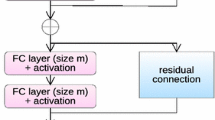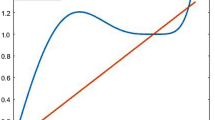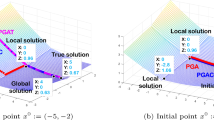Abstract
The generalized singular value decomposition (GSVD) of a pair of matrices expresses each matrix as a product of an orthogonal, a diagonal, and a nonsingular matrix. The nonsingular matrix, which we denote by X T, is the same in both products. Available software for computing the GSVD scales the diagonal matrices and X T so that the squares of corresponding diagonal entries sum to one. This paper proposes a scaling that seeks to minimize the condition number of X T. The rescaled GSVD gives rise to new truncated GSVD methods, one of which is well suited for the solution of linear discrete ill-posed problems. Numerical examples show this new truncated GSVD method to be competitive with the standard truncated GSVD method as well as with Tikhonov regularization with regard to the quality of the computed approximate solution.
Similar content being viewed by others
References
Alter, O., Brown, P. O., Botstein, D.: Generalized Singular Value Decomposition for Comparative Analysis of Genome-Scale Expression Datasets of Two Different Organisms, vol. 100, pp. 3351–3356 PNAS USA, (2003)
Bai, Z.: The CSD, GSVD, Their Applications and Computation, vol. 958. Institute for Mathematics 352 and its Applications, University of Minnesota, Minneapolis, (1992)
Bai, Z., Demmel, J. W.: Computing the generalized singular value decomposition. SIAM J. Sci. Comput. 14, 1464–1486 (1993)
Björck, Å.: Numerical Methods for Least Squares Problems. SIAM, Philadelpia (1996)
Brezinski, C., Rodriguez, G., Seatzu, S.: Error estimates for linear systems with applications to regularization. Numer. Algorithm. 49, 85–104 (2008)
Brezinski, C., Rodriguez, G., Seatzu, S.: Error estimates for the regularization of least squares problems. Numer. Algorithm. 51, 61–76 (2009)
Demmel, J.: The condition number of equivalence transformations that block diagonalize matrix pencils. SIAM J. Numer. Anal. 20, 599–610 (1983)
Donatelli, M., Reichel, L.: Square smoothing regularization matrices with accurate boundary conditions, J. Comput. Appl. Math., (in press)
Dykes, L., Reichel, L.: On the reduction of Tikhonov minimization problems and the construction of regularization matrices. Numer. Algorithm. 60, 683–696 (2012)
Engl, H. W., Hanke, M., Neubauer, A.: Regularization of Inverse Problems. Kluwer, Dordrecht (1996)
Golub, G. H., Van Loan, C. F., 4th edn.: Matrix Computations. Johns Hopkins University Press, Baltimore (2013)
Hansen, P. C.: Regularization, GSVD and truncated GSVD. BIT 29, 491–504 (1989)
Hansen, P. C.: Rank-Deficient and Discrete Ill-Posed Problems. SIAM, Philadelphia (1998)
Hansen, P. C.: Regularization tools version 4.0 for Matlab 7.3. Numer. Algorithm. 46, 189–194 (2007)
Horn, R. A., Johnson, C. R.: Topics in Matrix Analysis. Cambridge University Press, Cambridge (1991)
Kindermann, S.: Convergence analysis of minimization-based noise level-free parameter choice rules for linear ill-posed problems. Electron. Trans. Numer. Anal. 38, 233–257 (2011)
Kindermann, S.: Discretization independent convergence rates for noise level-free parameter choice rules for the regularization of ill-conditioned problems. Electron. Trans. Numer. Anal. 40, 58–81 (2013)
Lee, C. H., Alpert, B. O., Sankaranarayanan, P., Alter, O.: GSVD comparison of patient-matched normal and tumor aCGH profiles reveals global copy-number alterations predicting glioblastoma multiforme survival, vol. 7, p. 30098. PLoS One (2012)
Noschese, S., Reichel, L.: Inverse problems for regularization matrices. Numer. Algorithm. 60, 531–544 (2012)
Noschese, S., Reichel, L.: A modified TSVD method for discrete ill-posed problems, Numer. Linear Algebra Appl., (in press)
Reichel, L., Rodriguez, G.: Old and new parameter choice rules for discrete ill-posed problems. Numer, Algorithms 63, 65–87 (2013)
Reichel, L., Ye, Q.: Simple square smoothing regularization operators. Electron. Trans. Numer. Anal. 33, 63–83 (2009)
Sun, J. G.: Condition number backward error for the generalized singular value decomposition. SIAM J. Matrix Anal. Appl. 22, 323–341 (2000)
Trefethen, L. N., Bau, D.: III, Numerical Linear Algebra. SIAM, Philadelphia (1997)
van der Sluis, A.: Stability of the solution of linear least squares problems. Numer. Math. 23, 241–254 (1975)
Author information
Authors and Affiliations
Corresponding author
Additional information
Research supported in part by NSF grant DMS-1115385 and a grant from SAPIENZA Universitá di Roma.
Rights and permissions
About this article
Cite this article
Dykes, L., Noschese, S. & Reichel, L. Rescaling the GSVD with application to ill-posed problems. Numer Algor 68, 531–545 (2015). https://doi.org/10.1007/s11075-014-9859-3
Received:
Accepted:
Published:
Issue Date:
DOI: https://doi.org/10.1007/s11075-014-9859-3




